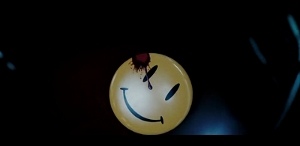 As if anyone doesn’t already know, Watchmen is an award-winning, twelve-issue comic book created by the writer/magician Alan Moore and the artist Dave Gibbons, originally published by DC Comics in that dark and distant year of your lord, 1986. Steeped in Reagan-era pessimism and dreams of nuclear holocaust, the book did more for superhero storytelling than all Frank Miller’s work combined. It dragged the genre, kicking and screaming, into the late twentieth century, disguising its social relevance with a baroque self-reflexiveness now recognized as the hallmark of comic’s Iron Age.
As if anyone doesn’t already know, Watchmen is an award-winning, twelve-issue comic book created by the writer/magician Alan Moore and the artist Dave Gibbons, originally published by DC Comics in that dark and distant year of your lord, 1986. Steeped in Reagan-era pessimism and dreams of nuclear holocaust, the book did more for superhero storytelling than all Frank Miller’s work combined. It dragged the genre, kicking and screaming, into the late twentieth century, disguising its social relevance with a baroque self-reflexiveness now recognized as the hallmark of comic’s Iron Age.
It is also, now, with the release of the extra-super-duper-special Ultimate Edition, a three and a half hour, suburban sprawl of a film, directed by MTV alum Zack Snyder. Reviewers love to crow about Watchmen‘s pivotal nature, seeing its reconstruction into a can’t-help-but-call-it-“epic” film as a watershed moment for superherodom. These contentions are as accurate as they are illiterate, removing the story from its proper place and time. An intelligent critique of this film has not and (I’ll obviously argue) cannot be written without a true understanding of the context that birthed Watchmen in the first place. {More}
